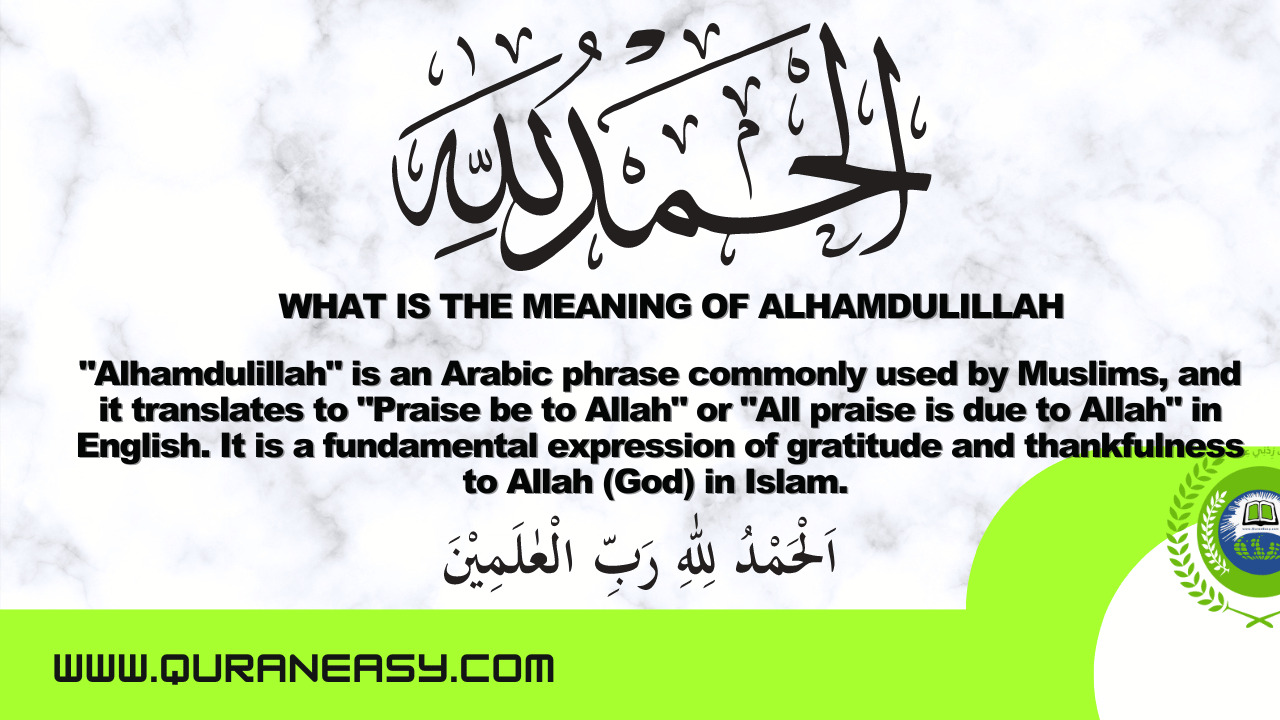Meaning Of Alhamdulillah
“Alhamdulillah” is an Arabic phrase commonly used by Muslims, and it translates to “Praise be to Allah” or “All praise is due to Allah” in English. It is a fundamental expression of gratitude and thankfulness to Allah (God) in Islam. Muslims use this phrase to acknowledge and appreciate the blessings, favors, and guidance they receive from Allah in their daily lives. “Alhamdulillah” is a way of recognizing and affirming that all good things come from Allah, and it is often uttered in moments of joy, contentment, or when facing challenges to express trust in Allah’s wisdom and plan.
Pronunciation of Alhamdulillah: Expressing Gratitude and Praise
The pronunciation of Alhamdulillah is an essential aspect of using this phrase correctly and respectfully. Here, we provide guidance on how to pronounce it accurately in both Arabic script and phonetics for English speakers:
Alhamdulillah In Arabic Script:
Here is the Alhamdulillah in Arabic text,
-
ٱلْحَمْدُ لِلَّٰهِ (al-Ḥamdu lillāh).
- Alhamdulillahi rabbi l-ʿālamīn is written as: ٱلْحَمْدُ لِلَّٰهِ رَبِّ ٱلْعَالَمِينَ.
Pronunciation Of Alhamdulillah in English
- Alhamdulillah: Pronounced as [ahl-hahm-doo-lil-lah]. It is a flowing and melodious phrase, with the emphasis on the “doo” and “lah” syllables. The “al” at the beginning is pronounced like “ahl.”
- Alhamdulillahi rabbi l-ʿālamīn: Pronounced as [ahl-hahm-doo-lil-lah-hee rab-bee l-‘ah-lah-meen]. This longer variant maintains the same melodic flow, with the additional emphasis on “rab-bee” and “ah-lah-meen.”

These pronunciations are crucial for Muslims to ensure that when they use Alhamdulillah in their daily lives, they do so with sincerity and respect for its significance.
Transliteration of Alhamdulillah
Transliteration of Alhamdulillah into English can vary slightly, as you’ve mentioned. The primary goal is to represent the Arabic pronunciation in a way that helps non-native speakers with the English alphabet. Here are a few common transliterations:
- Alhamdulillah: This maintains the closest similarity to the Arabic pronunciation and is commonly used.
- Al-hamdulillah: Adding a hyphen between “Al” (the) and “hamdulillah” helps clarify the separation of words for pronunciation.
- Hamdullah: This simplified version omits the Arabic “Al” and combines “hamdulillah.”
- Hamdulillah: Similar to the above, this version omits the Arabic “Al.”
- Al hamdu lillah: Breaks down the components of the phrase for clearer pronunciation.
- Hamdoullah: A less common but still understandable transliteration.
- Al-Hamdi Lil lah: A variation with hyphens to emphasize the divisions between words.
- Al-HAM-du-LI-lah: A breakdown with capitalized syllables for clearer pronunciation.
- Al ham du allah: Another simplified version that omits the “dulillah” part.
These transliterations serve the purpose of helping non-Arabic speakers approximate the pronunciation of “Alhamdulillah” using the English alphabet. The choice of transliteration may vary depending on individual preference or regional differences in pronunciation.
Why Do Muslims Say Alhamdulillah?
Muslims say Alhamdulillah or hamdulilah for several reasons:
- Appreciation and Gratitude: Saying Alhamdulillah is a way for Muslims to show their appreciation and gratitude to the creator, Allah. It is an acknowledgment that all good things come from Allah.
- In Good and Challenging Times: Muslims are encouraged to say not only when good things happen in their lives but also when facing difficulties. This is because they believe that Allah’s wisdom is beyond human comprehension, and even in challenging situations, there may be hidden blessings.
- Humility: Saying Alhamdulillah reminds Muslims that everything that happens in their lives is by the will of Allah. It fosters humility and the recognition that humans are not in complete control of their destinies.
- Positive Mindset: Expressing gratitude through Alhamdulillah helps maintain a positive mindset. It encourages individuals to focus on the blessings they have rather than what they lack.
- Connection with Allah: Its strengthens the spiritual connection between Muslims and Allah. It serves as a reminder of their dependence on Allah for all aspects of life.
When to Say Alhamdulillah
Saying Alhamdulillah is a central practice in the lives of Muslims, and it can be used in a variety of situations to express gratitude and faith. Here, we explore the different scenarios where saying Alhamdulillah is not only acceptable but encouraged:
- Daily Blessings: One of the most common occasions to say Alhamdulillah is when recognizing and appreciating daily blessings. From waking up in the morning to the simple pleasures of life, such as having food on the table, a roof over one’s head, and the company of loved ones, Muslims are encouraged to say Alhamdulillah as a constant reminder of their gratitude for these gifts. It is a way of acknowledging that every moment and every provision is a blessing from Allah.
- Achievements and Success: When muslims achieve success, whether in academics, career, or personal endeavors, saying Alhamdulillah is a means of attributing that success to Allah’s guidance and support. For example, after acing a difficult exam, someone might exclaim, “Alhamdulillah! I got an A in chemistry!” This expression of gratitude recognizes that one’s abilities and opportunities are ultimately governed by Allah.
- Health and Well-Being: Good health is a priceless gift, and Muslims acknowledge this by saying Alhamdulillah when they are in good health or recover from illness. This expression reflects an understanding that physical well-being is a blessing from Allah and a reminder to take care of one’s body.
- Prayer and Dhikr: Alhamdulillah is an integral part of Islamic prayers and dhikr (remembrance of Allah). In every unit of the daily five prayers (Salah), Muslims begin with the recitation of “Alhamdulillahi Rabbil ‘aalameen,” emphasizing that all praise and gratitude belong to Allah, the Lord of the worlds. This practice reinforces the importance of gratitude in a Muslim’s daily spiritual life.
- Acceptance of Trials and Difficulties: Perhaps one of the most profound aspects of saying Alhamdulillah is its use in times of adversity. Muslims understand that trials and difficulties are a part of life’s tests, and by saying Alhamdulillah during challenging moments, they accept Allah’s decree with patience and trust. This act of submission acknowledges that even hardships have a purpose and are under Allah’s control.
In essence, Alhamdulillah can be used as both a secular exclamation of pleasure, similar to how people of other faiths might say, “Thank God,” and as a profound expression of faith, gratitude, and acceptance in various aspects of life. By consistently using this phrase in diverse situations, Muslims maintain a deep sense of connection with Allah, recognizing His role in every facet of their existence. Ultimately, Alhamdulillah serves as a reminder that all situations, whether joyous or challenging, have been created by God, reinforcing a sense of trust in His divine plan.
When should Say Alhamdulillah?
Can Say and Read Alhamdulillah in Various Situations:
Muslims incorporate this phrase into their lives in various situations as a means of expressing gratitude, acknowledging Allah’s role, and praising Him:
- After Sneezing: When sneezes you should say “Alhamdulillah” to thank Allah for good health and seek blessings for themselves and others.
- Waking Up: Upon waking up in the morning, say “Alhamdulillah-hillathee ah-yana ba’da ma ama tana wa ilayhi nushoor” acknowledges Allah for the gift of life and the hope of resurrection.
- After Eating or Doing Good Deeds: Muslims say “Alhamdulillah” after meals to express gratitude for sustenance and energy. It is also used to acknowledge good deeds done throughout the day.
- Response to “How are you?”: When asked, “Keifik?” or “Keifilhal?” (How are you?), a common response is “Alhamdulillah,” indicating that the person is fine and expressing gratitude for their well-being.
- After Salah (Prayer): After each of the five daily prayers, Muslims engage in dhikr, which includes saying Subhanallah 33 times, Alhamdulillah 33 times and Allahu Akbar 34 times to seek Allah’s blessings and ease in their lives.
- Praising Allah: Muslims say “Alhamdulillah” anytime they desire to praise and thank Allah for His blessings and guidance.
Benefits of Alhamdulillah
Saying Alhamdulillah holds profound benefits in the lives of Muslims. This simple yet powerful phrase, meaning “Praise be to God” or “Thank God,” goes beyond words; it’s a way of life. Here are the benefits of incorporating Alhamdulillah into daily living:
- Gratitude: Alhamdulillah is a constant reminder to be grateful for the blessings in life. Recognizing and appreciating even the smallest favors fosters a positive and contented mindset.
- Humility: Saying Alhamdulillah acknowledges that all good things come from Allah. It keeps individuals humble, recognizing their dependence on the Creator.
- Positive Habits: Expressing gratitude through Alhamdulillah encourages positive habits. It shifts the focus from what’s lacking to what’s present, promoting mindful decisions and contentment.
- Deeper Connection: Regular use of Alhamdulillah strengthens the spiritual bond between Muslims and Allah. It emphasizes Allah’s role in every aspect of life, from the mundane to the profound.
- Acceptance of Trials: When facing challenges, saying Alhamdulillah is an act of submission and trust in Allah’s wisdom. It helps individuals accept difficulties with patience and faith.
- Prayer and Worship: Alhamdulillah is an integral part of Islamic prayers (Salah) and dhikr (remembrance of Allah). It enhances the spiritual experience and reinforces gratitude in worship.
- Improved Mental Well-being: Practicing gratitude through this dhikr has been linked to improved mental health. It reduces stress, anxiety, and depression while promoting overall well-being.
- Attracting More Blessings: Acknowledging Allah’s blessings through Alhamd can lead to even more blessings. Allah rewards gratitude with more favors, creating a cycle of abundance.
- Positive Outlook: hamdulillah cultivates a positive perspective, enabling individuals to see the good in every situation and maintain optimism in the face of adversity.
- Enhanced Relationships: Gratitude expressed through Alhamdulillah strengthens interpersonal relationships. It encourages a culture of appreciation and goodwill.
In essence, Alhamdulillah is not just a phrase; it’s a way to embrace life with a heart full of gratitude, humility, and trust in Allah’s divine plan. Its benefits extend beyond individual well-being, creating a harmonious and spiritually enriching environment for Muslims and those around them.
Alhamdulillah Quotes:
Here are some common Alhamdulillah quotes along with their Arabic script and phonetic pronunciations:
- All praise is due to God. (Arabic: ٱلْحَمْدُ لِلَّٰهِ, Phonetic: ʾalḥamdu lillāh).
- All praise is due to God, Lord of all the worlds. (Arabic: ٱلْحَمْدُ لِلَّٰهِ رَبِّ ٱلْعَالَمِينَ, Phonetic: ʾalḥamdu lillāhi rabbi l-ʿālamīna).
- Glorified is God and by His praise. (Arabic: سُبْحَانَ ٱللَّٰهِ وَبِحَمْدِهِ, Phonetic: subḥāna -llāhi wa-bi-ḥamdihī).
- Glorified is my Lord, the Great, and by His praise. (Arabic: سُبْحَانَ رَبِّيَ ٱلْعَظِيمِ وَبِحَمْدِهِ, Phonetic: subḥāna rabbiya l-ʿaẓīmi wa-bi-ḥamdihī).
- Glorified is my Lord, the Most High, and by His praise. (Arabic: سُبْحَانَ رَبِّيَ ٱلْأَعْلَىٰ وَبِحَمْدِهِ, Phonetic: subḥāna rabbiya l-ʾaʿlā wa-bi-ḥamdihī).
In conclusion, “Alhamdulillah” is more than a phrase; it’s a way of life for Muslims. It signifies the unwavering belief that all praise is due to Allah, the Lord of all worlds. It encourages gratitude, humility, and trust in Allah’s divine plan. As Muslims continue to embrace this expression, they find solace in knowing that, in all situations, there is reason to say, “Alhamdulillah.”





Leave A Comment